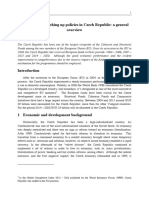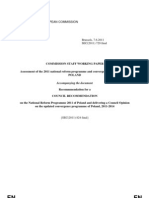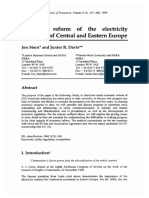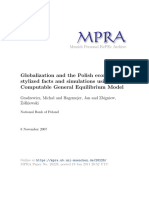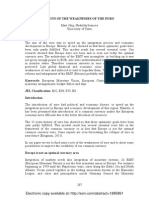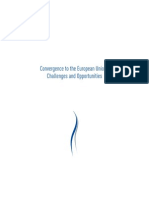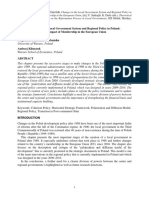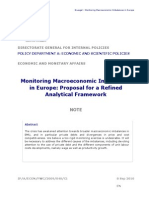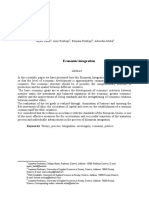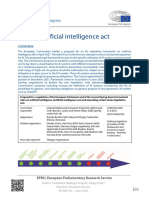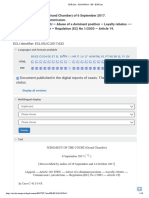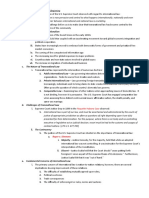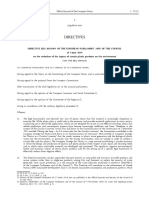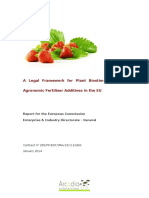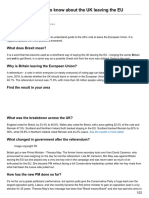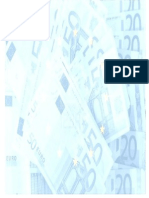The Czech Republic - Impacts of and Experience With EU Membership
The Czech Republic - Impacts of and Experience With EU Membership
Uploaded by
Brisold ArapiCopyright:
Available Formats
The Czech Republic - Impacts of and Experience With EU Membership
The Czech Republic - Impacts of and Experience With EU Membership
Uploaded by
Brisold ArapiOriginal Description:
Original Title
Copyright
Available Formats
Share this document
Did you find this document useful?
Is this content inappropriate?
Copyright:
Available Formats
The Czech Republic - Impacts of and Experience With EU Membership
The Czech Republic - Impacts of and Experience With EU Membership
Uploaded by
Brisold ArapiCopyright:
Available Formats
EASTERN JOURNAL OF EUROPEAN STUDIES Volume 2, Issue 2, December 2011 21
The Czech Republic impacts of and experience
with EU membership
Ivo LOSARK*
Abstract
This paper analyses the impact of the post-accession experience of the Czech
Republic in the years 2004-2011. In particular, it focuses on the integration into
the EU internal market, preparation for Eurozone accession, transfers from the
EU budget and the formulation of the EU energy policy. In each policy area,
both the impact of the existing EU regulatory framework and Czech preferences
for its reforms are covered. The last section of the paper (chapter 6) describes
the Czech institutional adaptation to the EU membership, in particular the 2009
Czech presidency experience.
Key words: Czech Republic, European Union enlargement, internal market,
Presidency of the Council of EU, transition periods, EU energy policy, EU
budget.
JEL Classification: F15, F36, O52, Q4
1. Introduction
The objective of the following text is to map several areas where the EU
accession of the Czech Republic has changed the political, economic and
regulatory environment in the Czech Republic. In particular, the text will
concentrate on three factors of the post-accession development which will
receive a particular attention.
The first one is the importance of the regulatory change as a result of the
shift from the asymmetric association status to full membership for the Czech
Republic through the 2004 accession. From this perspective, the major challenge
for the post-accession Czech Republic seems to be the transition to the position
of an active player in the EUs decision-making regulatory structures.
The second element of the Czech post-accession experience, which will
be demonstrated later in the text, was that the impact of the post-accession
*
Ivo losark is lecturer at the Department of European Studies, Charles University in
Prague, Czech Republic; e-mail: islosarcik@europeum.org.
22 Ivo LOSARK
experience on the economic situation in the Czech Republic was not radical. The
post-accession development can be interpreted primarily as an extrapolation of
the pre-accession association status in combination with the mitigation impact of
the transitional periods contained in the accession acquis.
The third feature analysed is the dynamic of the process of the Czech
experience as a EU member when the Czech government has undergone some
radical shifts in its position regarding several key EU projects, such as Eurozone,
during the six post-accession years.
2. Czech adaptation to the EUs internal market
The Czech Republic is usually described as a small open economy. The
Czech export is directed primarily towards the European Union (e.g. 85% of
total export in 2008, 84% in 2009) with Germany as the dominant export target
(30% of total export in 2008, 32% in 2009), followed by Slovakia (9% of total
exports in 2008, 8% in 2009), France, Poland, and Austria (Czech Statistical
Office, 2011). The inter-connection between Czech and German economy has
reached such intensity that the Czech Republic has been even labelled as
another German Lander.1
In the first years after the EU accession, the Czech economy experienced
an unprecedented growth since the beginning of the economic transformation at
the beginning of the 90s2. The growth was accompanied by an increase in labour
costs and by the strengthening of the Czech crown.
The impact of the crisis of 2008-2011 has been relatively limited. The
major reason is the conservative approach of Czech banks in the pre-crisis
period. Therefore, no governmental bank rescue package has been required.
Furthermore, the vast majority of the Czech private (household) debt has been
denominated in Czech crowns, which made the financial situations of
households less vulnerable to the currency fluctuation and has prevented
problems experienced, for instance, by Hungary since 2008.
As an export-oriented economy, however, the Czech Republic has been
very sensitive to the consumption trends of its EU neighbours, particularly in
Germany. The export to Germany dropped almost by 10% in 2009 in
comparison with previous years (Czech Statistical Office 2011) and the
economic recovery in Germany in 2010 was reflected in the growth of Czech
exports. The impact of the crisis onto the Czech Republic has also been
1
Zmenk, Miroslav. Sedmnct spolkov? Euro, January 24, 2011.
GNP growth in the post-accession years was as follows: 4.5 % (2004), 6.3% (2005),
6.8% (2006), 6.1% (2007), 2.5% (2008), -4.1% (2009), 2.3% (2010); estimation for 2011
is 2.5% . In contrast, in the pre-accession years 1999-2003, the GNP growth was
between 1.3% (1999) and 3.6% (years 2001 and 2003) (Czech Statistical Office, 2011).
2
THE CZECH REPUBLIC IMPACTS OF AND EXPERIENCE WITH EU MEMBERSHIP 23
mitigated by the relatively low public debt of the Czech state, albeit the
pessimistic dynamics of its development. In 2010, the public debt of the Czech
state reached 36.6% GNP (in comparison to 21.1% in 2004) and the estimate for
2011 is 42% of GNP (Czech Statistical Office, 2011). Against the general trend
in the EU, the position of public finances of the Czech Republic was upgraded
by Standard & Poors from the A to AA- category in August 2011.
The EU membership has been generally considered as a significant, if not
the major, factor of the Czech post-accession economic growth. However, it can
be argued that the most influential factor of the post-enlargement economic
environment has not been the formal opening of the internal market per se. Since
the tariff barriers and quotas for industrial good were removed even before the
Czech accession (as result of the association regime) and significant barriers in
the free movement of services survived even in the post-accession period, the
increase in the credibility and predictability of the regulatory environment in the
Czech Republic and the removal of some technical and administrative barriers
against mobility due to the EU membership can be identified as the most
significant impact of the Czech accession to the EU (Marek and Baun, 2011,
pp.106-108).
As an EU member, the Czech Republic has gained a potential to influence
the regulatory framework of the internal market as an active player, in contrast
to the position of a passive recipient of acquis in the pre-accession period. The
experience of the first post-accession years has demonstrated with great clarity
the importance of defining and pursuing national interests within the EU
structures. In several cases, new EU rules have created significant problems to
the corresponding segments of the Czech economy a frequently used example
is the impact of the new EU regulatory framework for sugar which caused a
radical implosion of the sugar production industry in the Czech Republic.
The Czech Republic has pursued two major trends in the internal market
during its post-accession years. The first has been the support for liberalization
within the internal market; in other words for removing the remaining national
barriers within internal market. Examples of this strategy include Czech calls for
a termination of transitional periods, for the free movement of workers and/or
support of the EU initiatives for further liberalization of the free movement of
services. In the latter case, the Czech representatives criticized the gradual
reduction of the originally ambitious liberalization plan contained in the
Commissions proposal of the Bolkestein directive (directive on free
movement of services) during the legislative process in the European Parliament
and the Council; however, the Czech MEPs voted even for the final, less
ambitious, version of the directive since even the final version of the directive
had eliminated some existing problems and clarified several rules of the service
mobility within the internal market.
24 Ivo LOSARK
The second trend within the internal market, which has been supported by
the Czech Republic since its accession to the European Union, has been the
opposition against new regulatory initiatives establishing new EU standards,
particularly in the domain of taxation or employment policy. Czech politicians
consistently vetoed EUs initiatives for higher tax harmonization in the EU
(quite symbolically, the first Czech veto was applied in the debate on an increase
of the consumption tax on beer). At the same time, the Czech Republic has not
adopted explicit declarations or (quasi)legislative measures stating the national
sovereignty in tax policy, as the Slovak Republic did in 2007.
The EUs impact on the labour market and mobility of workers in the
Czech Republic deserves further elaboration. The full mobility of Czech workers
to other EU states was limited (until 1st May 2011) by transitional periods
negotiated in the accession treaties. The impact of transitional periods was
weakened by the fact that no new EU state in Central Europe and only some old
EU states actually used the regulatory potential contained therein and the list of
EU states applying the transitional periods has been gradually narrowing since
20043. Furthermore, citizens of the Czech Republic used the potential of the
intra-EU mobility less intensively than citizens of its neighbours. Reasons
behind are primarily better economic performance of the Czech Republic in both
pre- and post-accession years and traditional less pro-mobility socio-economic
patterns in the Czech society.
At the same time, the Czech Republic has developed into a significant
recipient county of labour mobility streams in the post-accession period. The
most important countries of origin of foreign workers employed in the Czech
Republic include both EU states (Slovakia, Poland) and non-EU countries
(Ukraine, Vietnam). The EU accession does not seem to have a significant
impact on the structure of the inflow of foreign workers and major initiatives in
this domain remain under autonomous decision of Czech policy makers. For
instance, the Czech Republic opted not to apply transitional periods in the most
recent enlargement (Bulgaria and Romania).
The Czech position towards the liberalization of transport services has its
specificity, similar to those which emerged in Austria. The Czech situation is
primarily influenced by the location of the Czech Republic on the major
transport corridors within the European Union. In particular, the land transport
(haulage) tests the limits of the Czech transport infrastructure (highways)
capacity and generates a financial burden for the Czech budget as a result of the
construction and maintenance costs. The Czech Republic reacted by an attempt
to transfer part of these costs to the transport operators; and the existence of the
3
The United Kingdom, Ireland and Sweden has not used transitional periods at all,
Spain, Finland and Portugal opened their labour markets to Czech workers in 2006 and
France in 2008.
THE CZECH REPUBLIC IMPACTS OF AND EXPERIENCE WITH EU MEMBERSHIP 25
EU limits on the price of vignettes (toll stickers) for heavy trucks has been one
of the factors for the Czech decision to introduce a road-toll system, calculated
for each vehicle according to the distance actually travelled, where the EU
provides more discretion for individual member states.
3. Eurozone and economic governance
The Czech Republic did not become a (full) member of the Eurozone at
the moment of its accession to the EU. The experience of delayed accession to
the Eurozone has been shared also by other new EU members. What
distinguishes the Czech Republic from other new members of the enlarged EU is
the fact that the approach of the Czech Republic to the European monetary
integration project had experienced a radical shift since 2004.
Originally, the Czech executive expressed the intention to join the
Eurozone within a relatively short time framework/horizon, with target dates of
January 1, 2010 (based on the plan of the Social Democratic government in
2005). Later, the updated governmental strategies for the Eurozone postponed
the target date for 2012 while the Czech National Bank stressed its neutral
position regarding the date of the Eurozone entry (losark et al, 2011, pp. 101102, Bene and Braun, 2008, p. 65). The only vocal critic of the Eurozone
project in the Czech Republic at the moment of the Czech accession to the EU
was the President of the Republic, Vclav Klaus (Bene and Braun, 2008, p. 82).
A major argument in favour of the Eurozone accession was the expected
stabilization impact on the Czech industry and the export-oriented industrial
lobby (e.g. car producers) was also the most vocal supporter of a prompt
replacement of the Czech national currency by the Euro, particularly with the
objective to increase the stability and predictability of the business environment
in the Czech Republic.
However, the Czech government, since the very beginning of the Czech
EU membership, has expressed a need to balance the impact of the future
Eurozone accession onto different actors in the Czech Republic. It has also
stressed the political nature of the timing of the Czech accession to the
Eurozone, regardless of the formal obligation of the Czech Republic to make
steps towards the Eurozone accession, as provided in the Accession Treaty. To
identify and evaluate the impact of the Eurozone accession on different socioeconomic actors in the Czech Republic was also the key objective of the major
analytical advisory study commissioned by the Czech government in 2007
(Lacina, 2007).
However, the Czech position has changed radically since 2008 and debate
about plans to join the Eurozone, or even about a target date, have virtually
disappeared at present (Bene and Braun, 2011, pp. 59-60). Reasons behind this
development are threefold. The first is the change in composition of the Board of
Governors (Banking Board) of the Czech National Bank, a body co-responsible
26 Ivo LOSARK
(together with the Ministry of Finance) for Czech preparation for the Eurozone
membership. Members of the Board of Governors are appointed by the President
of the Republic for a six-year term and the appointment(s) are exclusively within
discretion of the President (i.e. no approval of the government is required). As
President Vclav Klaus has been in office since 2003, he has directly appointed
all serving members of the Board of Governors by the end of the decade.
Logically, President Klaus appointed economists with an approach to the
Eurozone similar to his own, i.e. primarily sceptical to the viability of the
Eurozone project.
The second reason behind the decline in the Czech support of Eurozone
membership is the impact of the 2008-2011 economic crisis on the Czech
Republic. As demonstrated above, the impact of the crisis on the Czech public
finances was relatively limited. However, even the limited impact of the crisis
has moved the Czech public budget outside the limits of the convergence criteria
necessary for the Eurozone accession. The present (2011) Czech government
declares itself the government of financial responsibility and the Greek crisis
was used by centre-right political parties as an argument against the centre-left
political parties during the 2010 election campaign. However, the obligation to
comply with the Eurozone convergence criteria does not occur in the
governmental argumentation for fiscal responsibility and/or austerity measures;
the arguments used are primarily focused on the need for the stability and
sustainability of the Czech national budget.
The third reason for the Czech sceptical approach to the Eurozone is the
2010-2011 Eurozone internal crisis. In general, the Czech Republic tended to
adopt the wait and see tactics towards the crisis and refused to make any longterm commitments regarding its future participation in the Eurozone project. In
line with this passive approach is the Czech decision not to participate in the
European financial mechanisms formed during the crisis, such as the European
Financial Mechanism which was joined by all non-Eurozone countries with the
exception of the United Kingdom, Sweden, Hungary and the Czech Republic.
(Bene and Braun, 2011, pp. 66-67).
Thus, the statement of the President Klaus that, in contrast to his refusal of
the Czech accession to the Eurozone, he could imagine his support of the Czech
accession to a post-Eurozone monetary union of the northern EU states linked
with the German economy (Markozone) is a rather anecdotic comment. In a
more general and serious analysis, the President of the Republic frequently
comments on the unsuitability of the Eurozone membership for the EU states
with lower economic productivity (Klaus 2011).
4. Energy policy
The energy policy of the Czech Republic is relatively complicated,
reflecting both the historical and geographical context of the Czech state. The
THE CZECH REPUBLIC IMPACTS OF AND EXPERIENCE WITH EU MEMBERSHIP 27
energy mix of the Czech Republic includes domestically produced coal,
imported gas and crude oil, nuclear energy and a limited amount of renewable
resources (water, solar, wind).
The governmental energy policy has to balance the mutually competing
disadvantages of the individual elements of the energy mix which include the
supply interruption risk (gas, crude oil), negative impact on the environment
(coal) and ideologically driven criticism (nuclear energy). In the post-accession
years, the Czech Republic has experienced problems both with the interruption
of supplies from Russia (e.g. gas crisis in January 2009) and inter-state tension
linked with the nuclear energy (in particular, diplomatic tension and public
protests in Austria).
The Czech energy policy at the EU level thus follows two directions. The
first one is a call for more efficient EU external policy focused on the stability of
energy supplies, including EU support for infrastructure projects (Czech support
for Nabucco gas pipeline or for strengthening the intra-EU electricity grid) and
for firm EU position(s) during negotiations with third-party countries. However,
the Czech Republic supports primarily EU funding of specific infrastructure
projects instead of creation of a general EU financial framework for energy
infrastructure (such as Connection Europe Facility) that is perceived as a threat
to a scope of EU funding of general policy of social and territorial cohesion.
The second direction of the Czech activity at the EU level is the
opposition to the attempts to regulate the nuclear energy and the relatively
sceptical approach to the EU carbon emission policy (Bene and Braun, 2010,
pp. 66-67).
5. The EU budget
The expected financial transfers from the EU budget were frequently used
as the argument in favour of the Czech accession to the EU. As a state with a
GDP per capita bellow the EU average, the Czech Republic had a strong
potential to turn into a significant beneficiary of the intra-EU transfers. This
potential has materialized in the first post-accession years when the Czech
Republic developed into a net recipient from the EU budget, particularly in the
domain of economic and social cohesion (and only gradually in the CAP, as
described later). From the short-term perspective, the major problems linked
with the EU budget in the Czech Republic concerned the technicalities of the
utilization of funds allocated to the Czech Republic, such as setting the
respective administrative bodies in the Czech Republic, negotiating the
agreement(s) with the European Commission on the cohesion policy priorities,
the red tape linked with project implementation, the co-financing required by the
EU rules or occasional corruption connected with financial transfers. Insufficient
extraction of the EU funds caused by a lack of quality programs and by the
28 Ivo LOSARK
intensive administrative burden on private applicants is usually identified as the
major problem in the first post-accession years.
At the same time, the Czech Republic has been a critic of the structures
and priorities of the EU budget, particularly opposing the allocation of resources
to the Common Agricultural Policy at the expense of other policy areas, such as
education or modern infrastructure. The critique of the CAP spending by the
Czech Republic has been simplified by the relatively small size of the Czech
agricultural sector, in comparison with other new EU states. On the other hand,
the Czech position regarding the EU spending is more pragmatic than
ideologically-driven and the Czech Republic proved to be able to lobby in
favour of specific Czech agriculture interests, such as the important role of large
farms in the Czech agriculture (Dostl, Karsek, Thim, 2011, p. 120).
Since it belongs to the more advanced and richer part of the new EU
states, it is not clear whether the Czech Republic will be net-recipient or netpayer in the medium term perspective, such as after 2020.
Therefore, the Czech position towards the budget seems to be trapped
between two colliding objectives. The Czech priority is the general expansion of
the EU budget, where the Czech Republic would benefit as a net-recipient. The
second one is the pressure on the reform of the EU spending structure which
would more properly correspond to the Czech priorities and to the fact that, in
the medium term perspective, some Czech regions are likely to cease their
eligibility to a significant number of segments for the EUs funding.
6. Institutional adaptation, the 2009 Czech Presidency and ratification of
the Lisbon Treaty
Two events in the Czech Republic distinguished themselves among the
generally low profile activities of the Czech state within the EU. The first was
the Czech presidency of the European Council and the Council of the EU in the
first half of year 2009; the latter was the ratification process of the Lisbon Treaty
in the second half thereof.
The Czech Presidency demonstrated both strong features and weaknesses
of the Czech behaviour within the European Union. The Czech Presidency
adopted a relatively moderate program focused on internal EU economic
liberalization, energy security and Eastern dimension of the EU foreign policy.
Within these priorities, the Presidency focused on practical policy initiatives
(e.g. launching the summit of the Eastern Partnership organized in Prague) and
concrete legislative measures. At the same time, the Presidency activities were
from the very beginning hijacked by unexpected events outside the EU
(interruption of gas supplies caused by the dispute between Russia and Ukraine,
escalation of Gaza crisis).
In the economic sphere, the Czech presidency regarded its primary role as
the opponent and/or corrector of massive use of spending power of the EU states
THE CZECH REPUBLIC IMPACTS OF AND EXPERIENCE WITH EU MEMBERSHIP 29
(Bene and Karlas, 2010, pp. 74-75). Prime Minister Mirek Topolnek gained
even some unwelcomed attention from global media when he criticized the US
financial crisis plan as road to hell in his speech before the European
Parliament in March 2009. The Czech presidency also criticized, among others,
the national financial schemes stimulating purchasing of new vehicles (Bene
and Braun, 2010, pp. 65-66). Paradoxically, the Czech car industry was a
significant beneficiary of the stimulation programs introduced by its neighbours
(particularly by Germany and Slovakia) when its export to the countries in
question had increased as a result of the stimulation programs introduced by
local Slovak and German governments.
From the external perspective, however, the major event of the Czech
Presidency was the fall of the government in the middle of the presidency. This
political crisis, caused primarily by domestic political competition, significantly
weakened the performance of the Czech executive during the second half of the
Presidency, and seriously damaged the reputation of the Czech state.
The Czech Republic was a relatively active player during the preparation
of the Treaty establishing the Constitution for Europe. This pro-active approach
has not, however, continued during the preparation and ratification of the Lisbon
Treaty. The new Czech centre-right government did not belong to the most
ardent supporters of the treaty reform but, ultimately, the Lisbon Treaty was
approved by the Czech government. The following ratification procedure was
then interrupted twice by reviews before the Constitutional Court and further
delayed by the insistence of the President of the Republic that the Lisbon Treaty
should include guarantees against destabilization of the property regime in the
Czech Republic. This requirement has been tackled, albeit in a legally very
opaque form, at the EU level and the Czech Republic has been the last EU state
ratifying the Lisbon Treaty in the autumn of 2011.
7. Conclusions
EU has not turned into a panacea for all shortcomings of the Czech state.
At the same time, major fears of the EUs impact on the vulnerable elements of
the Czech economy or society have not materialized either.
Within the EU, the Czech Republic had to learn how to formulate and
defend national interests within the EU structures. After a relatively short postaccession learning phase, the Czech Republic started to systematically pursue
those elements of the EU integration which correlated with its export-oriented
economy and (allegedly) relatively low level of labour and welfare regulation.
However, while the Czech Republic proved to be a relatively skilful learner in
coping with the more technical and short-term policy objectives, debates about
the Lisbon Treaty and turmoil of the post-2008 crisis demonstrated that the
Czech Republic still keeps a rather low profile within the long-term trends of the
European integration project.
30 Ivo LOSARK
References
Bene, V., Braun, M. (2008), Evropsk rozmr esk zahranin politiky, in Koan, M.
(ed.), esk zahranin politika v roce 2007, Institute of International Relations, Praha,
pp. 61-91.
Bene, V., Braun, M. (2010), Evropsk rozmr esk zahranin politiky, in Koan, M.
(ed.), esk zahranin politika v roce 2009, Institute of International Relations, Praha,
pp. 61-87.
Bene, V., Braun, M. (2011), Evropsk rozmr esk zahranin politiky, in Koan, M.
(ed.), esk zahranin politika v roce 2010, Institute of International Relations, Praha,
pp. 59-91.
Bene, V., Karlas, J., (2010), Czech Presidency, Journal of Common Market Studies,
Vol. 48, Annual Review, pp. 69-80.
Czech Statistical Office (2011), Statistick roenka esk republiky, CSU, Praha.
Dostl, V., Karsek, T., Thim, M., (2011), Agenda for Czech Foreign Policy 2011,
Association for International Affairs, Praha.
Klaus, V. (2011), Pracujeme dostaten? Mme nrok
http://www.klaus.cz/clanky/2915 (approached September 20, 2011).
na
Euro?,
Lacina, L., (2007), Study of Euro Introduction Impact On the Economy of the Czech
Republic, Mendel University, Brno.
Marek, D., Baun M. (2010), esk republika a Evropsk unie, Barrister&Principal,
Brno.
losark, I., Kaskov, Z., Vka, J., Weiss, T. (2011), Fragmentation and Coexistence
of Leitbilder in the Czech Republic, in Brincker, G., Jopp, M., Rovna, L (eds.),
Leitbilder for the Future of the European Union, Nomos, Baden-Baden, pp. 74-118.
Zmenk, M. (2011), Sedmnct spolkov? Euro, January 24, available at:
http://www.vlada.cz/cz/ppov/ekonomicka-rada/clanky/miroslav-zamecnik-sedmnactaspolkova--80247/.
You might also like
- European Union Competition Law in The Airline Industry (Aviation Law and Policy) (Aviation Law and Policy Series) (John Milligan)Document321 pagesEuropean Union Competition Law in The Airline Industry (Aviation Law and Policy) (Aviation Law and Policy Series) (John Milligan)mbjfgcfgvbn booksNo ratings yet
- The Impact of Tax Treaties and EU Law On Group Taxation Regimes PDFDocument665 pagesThe Impact of Tax Treaties and EU Law On Group Taxation Regimes PDFHoa Hướng DươngNo ratings yet
- Cohesion and Catching Up Policies in Czech Republic: A General OverviewDocument16 pagesCohesion and Catching Up Policies in Czech Republic: A General OverviewValeria Puga ÁlvarezNo ratings yet
- Effects of Slovakia's Entry To EU (Including Adoption of Euro) On Slovakia's Car Industry by Zdenka BartschtDocument21 pagesEffects of Slovakia's Entry To EU (Including Adoption of Euro) On Slovakia's Car Industry by Zdenka BartschtEM-JournalNo ratings yet
- Structural Changes in The Economy of Latvia After It Joined The European UnionDocument13 pagesStructural Changes in The Economy of Latvia After It Joined The European UnionBianca HorvathNo ratings yet
- Topic 5.2 - CHALLENGES FACING THE EUROPEAN ECONOMIC AREA - BALANCING ECONOMIC INTEGRATION AND NATIONAL SOVEREIGNTYDocument2 pagesTopic 5.2 - CHALLENGES FACING THE EUROPEAN ECONOMIC AREA - BALANCING ECONOMIC INTEGRATION AND NATIONAL SOVEREIGNTYtunghihi281No ratings yet
- Integration EssayDocument7 pagesIntegration EssayCezar CorobleanNo ratings yet
- 3.3.1 The+Single+European+Market+20+years+on - +achievements,+unfulfilled+expectations++further+potentialDocument20 pages3.3.1 The+Single+European+Market+20+years+on - +achievements,+unfulfilled+expectations++further+potentialPatricia IdlNo ratings yet
- Taxation Trends in The European Union: Focus On The Crisis: The Main Impacts On EU Tax SystemsDocument44 pagesTaxation Trends in The European Union: Focus On The Crisis: The Main Impacts On EU Tax SystemsAnonymousNo ratings yet
- Taxation Trends in EU in 2010Document42 pagesTaxation Trends in EU in 2010Tatiana TurcanNo ratings yet
- Taylor & Francis, Ltd. Europe-Asia Studies: This Content Downloaded From 78.128.178.155 On Tue, 06 Mar 2018 12:49:47 UTCDocument21 pagesTaylor & Francis, Ltd. Europe-Asia Studies: This Content Downloaded From 78.128.178.155 On Tue, 06 Mar 2018 12:49:47 UTCAlejandra GheorghiuNo ratings yet
- Ecbop160 en PDFDocument46 pagesEcbop160 en PDFBruegelNo ratings yet
- EN EN: European CommissionDocument38 pagesEN EN: European Commissionpekod409No ratings yet
- European Economy: Economic Convergence in The Czech Republic and SlovakiaDocument20 pagesEuropean Economy: Economic Convergence in The Czech Republic and SlovakiaWillian CarvalhoNo ratings yet
- Transfer - European Review of Labour and Research-2010-Pitti-37-54Document18 pagesTransfer - European Review of Labour and Research-2010-Pitti-37-54Yudha Alief AprilianNo ratings yet
- European and American Banking SystemDocument9 pagesEuropean and American Banking Systemmhod omranNo ratings yet
- Challenges For Quality Governance in Central and Eastern EuropeDocument6 pagesChallenges For Quality Governance in Central and Eastern EuropeIgor TaralungaNo ratings yet
- Fiscal Governance in Central and Eastern Europe Before and After European Union Accession: What Role Europeanisation?Document29 pagesFiscal Governance in Central and Eastern Europe Before and After European Union Accession: What Role Europeanisation?Simona DavidNo ratings yet
- Simovic PDFDocument18 pagesSimovic PDFMarin RibarićNo ratings yet
- A Cold Welcome - The Unequal Terms of Eastern EnlargementDocument13 pagesA Cold Welcome - The Unequal Terms of Eastern EnlargementAndreea ConstantinNo ratings yet
- Catching Up and Falling Behind EconomicDocument33 pagesCatching Up and Falling Behind EconomicYuris ZegaNo ratings yet
- EN EN: European CommissionDocument24 pagesEN EN: European Commissionapi-58353949No ratings yet
- Piotr Malec CZDocument20 pagesPiotr Malec CZmalecpNo ratings yet
- Of Of: Bconomic Reform The Electricity Industries Central and Eastern EurodeDocument34 pagesOf Of: Bconomic Reform The Electricity Industries Central and Eastern EurodeBernardoNo ratings yet
- ViziDocument12 pagesVizileonidasoldierNo ratings yet
- The Analysis of The EU Policies Towards The Emerging Countries: A Case Study of EU-China RelationsDocument7 pagesThe Analysis of The EU Policies Towards The Emerging Countries: A Case Study of EU-China RelationsKaleli RockyNo ratings yet
- European UnionDocument6 pagesEuropean Unionno4russoNo ratings yet
- Between Success and Unsuccess in Absorbing Eu Funds - Poland vs. RomaniaDocument12 pagesBetween Success and Unsuccess in Absorbing Eu Funds - Poland vs. RomaniaAnonymous p52JDZOdNo ratings yet
- Foreign Direct Investment in The EU-25Document4 pagesForeign Direct Investment in The EU-25Mehmet AyNo ratings yet
- Economics of Turkish AccessionDocument9 pagesEconomics of Turkish Accession13chandarsNo ratings yet
- MPRA Paper 28228 PDFDocument24 pagesMPRA Paper 28228 PDFkrystianNo ratings yet
- Pesa 2011 CompleteDocument219 pagesPesa 2011 CompletesnaikjonesNo ratings yet
- Taxation Trends in The European Union - 2012 74Document1 pageTaxation Trends in The European Union - 2012 74d05registerNo ratings yet
- Essay On Economic Impacts of Euromarkets and Other Offshore Markets On Global Financial MarketDocument4 pagesEssay On Economic Impacts of Euromarkets and Other Offshore Markets On Global Financial MarketKimkhorn LongNo ratings yet
- Taxation Trends Report 2020.enDocument308 pagesTaxation Trends Report 2020.enviktor's VibesNo ratings yet
- 011 2004-CC20in20EstoniaDocument32 pages011 2004-CC20in20Estoniairhad3105No ratings yet
- Roots of The Weaknesses of The EuroDocument12 pagesRoots of The Weaknesses of The EuroCristi CepesiNo ratings yet
- 56 116 1 PBDocument7 pages56 116 1 PBСветлана СорокаNo ratings yet
- FYR Macedonia Convergence of The European UnionDocument113 pagesFYR Macedonia Convergence of The European UnionUNDP in Europe and Central AsiaNo ratings yet
- Transformation Index BTI 2012: Regional Findings East-Central and Southeast EuropeFrom EverandTransformation Index BTI 2012: Regional Findings East-Central and Southeast EuropeNo ratings yet
- New Risks Ahead The Eastward Enlargement of The EurozoneDocument7 pagesNew Risks Ahead The Eastward Enlargement of The EurozoneServicii TehnoredactareNo ratings yet
- Czech Republic Culture Field ReportDocument11 pagesCzech Republic Culture Field ReportAlliedschool DefencecampusNo ratings yet
- Ifs Presentation CIA 3Document21 pagesIfs Presentation CIA 3Ajay SinghNo ratings yet
- (Epstein & Jacoby, 2014) Eastern Enlargement Ten Years On-Transcending The East-West DivideDocument16 pages(Epstein & Jacoby, 2014) Eastern Enlargement Ten Years On-Transcending The East-West DivideReemNo ratings yet
- Changes in The Local Government System and Regional Policy in Poland: The Impact of Membership in The European UnionDocument26 pagesChanges in The Local Government System and Regional Policy in Poland: The Impact of Membership in The European UnionAndrzej KlimczukNo ratings yet
- The Impact of Brexit On The UK EconomyDocument4 pagesThe Impact of Brexit On The UK Economycheckpoint.purpleNo ratings yet
- Deloitte - Investing in CE 2011 - China - FINALDocument124 pagesDeloitte - Investing in CE 2011 - China - FINALNora AchkarNo ratings yet
- 2 CEP Revija Qorraj PDFDocument14 pages2 CEP Revija Qorraj PDFdiplomski DiplomskoNo ratings yet
- Economic Crisis in Europe - Causes Consequences and ResponsesDocument108 pagesEconomic Crisis in Europe - Causes Consequences and ResponsesEfkan AltınokNo ratings yet
- Crises in The Euro Area and Challenges For The European Union's Democratic LegitimacyDocument6 pagesCrises in The Euro Area and Challenges For The European Union's Democratic LegitimacyGerman Marshall Fund of the United StatesNo ratings yet
- Crisis ManagmentDocument10 pagesCrisis Managmentitsgerardo verdeciaNo ratings yet
- Crisis and Consolidation - Fiscal Challenges in Emerging EuropeDocument16 pagesCrisis and Consolidation - Fiscal Challenges in Emerging EuropeBogduNo ratings yet
- Monitoring Macro Economic Imbalances in Europe Proposal For A Refined Analytical FrameworkDocument16 pagesMonitoring Macro Economic Imbalances in Europe Proposal For A Refined Analytical FrameworkBruegelNo ratings yet
- The NATO Effect On The Economic Trends of Its New Member CountriesDocument2 pagesThe NATO Effect On The Economic Trends of Its New Member CountriesNaTo PoPiashviliNo ratings yet
- Economic Integration: Keywords: Theory, Process, Integration, Sovereignty, Economy, PoliticsDocument8 pagesEconomic Integration: Keywords: Theory, Process, Integration, Sovereignty, Economy, PoliticsNijazi HaliliNo ratings yet
- EU Enlargement and MigrationDocument23 pagesEU Enlargement and MigrationnoeljeNo ratings yet
- Free Labour Movement in EUDocument31 pagesFree Labour Movement in EUJonas SchindlerNo ratings yet
- Greece Country Strategy 2007-2010: Black Sea Trade and Development BankDocument18 pagesGreece Country Strategy 2007-2010: Black Sea Trade and Development BanklebenikosNo ratings yet
- EF1168ENDocument13 pagesEF1168ENJesse WellsNo ratings yet
- Economic Performance in South- East European Transition Countries After the Fall of CommunismFrom EverandEconomic Performance in South- East European Transition Countries After the Fall of CommunismRating: 5 out of 5 stars5/5 (1)
- Revised Withdrawal Agreement Including Protocol On Ireland and Nothern IrelandDocument64 pagesRevised Withdrawal Agreement Including Protocol On Ireland and Nothern IrelandChristian100% (1)
- Artificial Intelligence ActDocument12 pagesArtificial Intelligence ActHenryNo ratings yet
- Eu Report 2019 A PDFDocument8 pagesEu Report 2019 A PDFFahmida M RahmanNo ratings yet
- Intel Corp V European Commission 2017 (Case C-413:14 P)Document20 pagesIntel Corp V European Commission 2017 (Case C-413:14 P)Anjali TripathiNo ratings yet
- 2022-The General Court's Decisions On State Aid Law in Times of COVID-19 PandemicDocument24 pages2022-The General Court's Decisions On State Aid Law in Times of COVID-19 Pandemicllord.zhouNo ratings yet
- Single MarkettDocument4 pagesSingle Markettapi-305077843No ratings yet
- Roper v. Simmons: Paquette Habana CaseDocument57 pagesRoper v. Simmons: Paquette Habana CaserobMarley6No ratings yet
- 9834 EcDocument75 pages9834 Ecmugeonbas9No ratings yet
- Celex 32019L0904 en TXTDocument19 pagesCelex 32019L0904 en TXTAsenovNo ratings yet
- Risk Management in The Artificial Intelligence ActDocument19 pagesRisk Management in The Artificial Intelligence ActRubo PostoNo ratings yet
- AttachmentDocument10 pagesAttachmentLhene AngconNo ratings yet
- TheEconomist 2020 12 10Document296 pagesTheEconomist 2020 12 10merlindebergNo ratings yet
- IIL and EU LawDocument5 pagesIIL and EU LawCorneliu DoniNo ratings yet
- Right To Repair EU Commission DraftDocument7 pagesRight To Repair EU Commission DraftJack PurcherNo ratings yet
- SWD 2016 52 F1 Impact Assesment en V7 P1 842425Document103 pagesSWD 2016 52 F1 Impact Assesment en V7 P1 842425Mihaela BabiciNo ratings yet
- Fe1 Eu Law Night Before Notes: Institutional QuestionDocument15 pagesFe1 Eu Law Night Before Notes: Institutional QuestionSalman AkramNo ratings yet
- Free Movement of Goods NotesDocument31 pagesFree Movement of Goods NotesMaseng MathibaNo ratings yet
- Tourism Trends in European UnionDocument126 pagesTourism Trends in European UnionAnca TudoricuNo ratings yet
- Albania Report 2020Document125 pagesAlbania Report 2020Erjon DervishiNo ratings yet
- Food Law, Exam Notes, Cattolica PiacenzaDocument23 pagesFood Law, Exam Notes, Cattolica PiacenzaneedwaNo ratings yet
- A Legal Framework For Plant Biostimulants and Agronomic Fertilisers AdditivesDocument133 pagesA Legal Framework For Plant Biostimulants and Agronomic Fertilisers AdditivesKenan YılmazNo ratings yet
- Ireland and The European Union PowerpointDocument35 pagesIreland and The European Union Powerpointapi-340817649No ratings yet
- Regulation (EU) No 1025 - 2012Document22 pagesRegulation (EU) No 1025 - 2012RNo ratings yet
- J of Common Market Studies - 2002 - Huysmans - The European Union and The Securitization of Migration 1Document27 pagesJ of Common Market Studies - 2002 - Huysmans - The European Union and The Securitization of Migration 1Wissam DabboussiNo ratings yet
- BEUC Consumer Voice in EuropeDocument12 pagesBEUC Consumer Voice in EuropeelmedinNo ratings yet
- BBC - co.Uk-Brexit All You Need To Know About The UK Leaving The EUDocument22 pagesBBC - co.Uk-Brexit All You Need To Know About The UK Leaving The EUJavier FarjeNo ratings yet
- Book European Competition Law-2Document102 pagesBook European Competition Law-2alessandroNo ratings yet
- Analysis of The Impact of Brexit On Logistics and Supply Chain Activities in The UK - "Teething Problems" or Permanent Impacts?Document131 pagesAnalysis of The Impact of Brexit On Logistics and Supply Chain Activities in The UK - "Teething Problems" or Permanent Impacts?krish alexNo ratings yet


